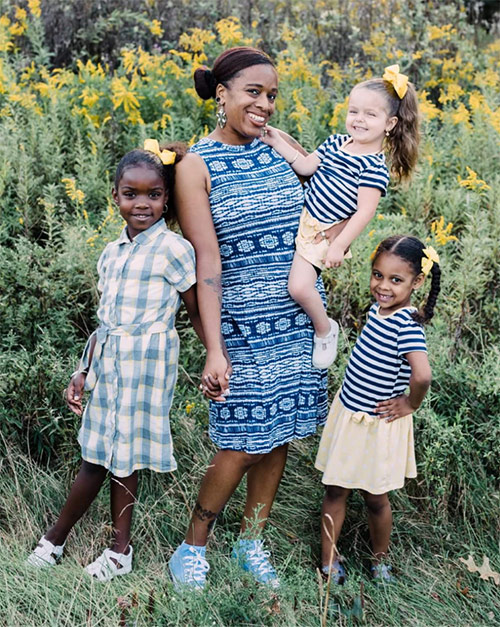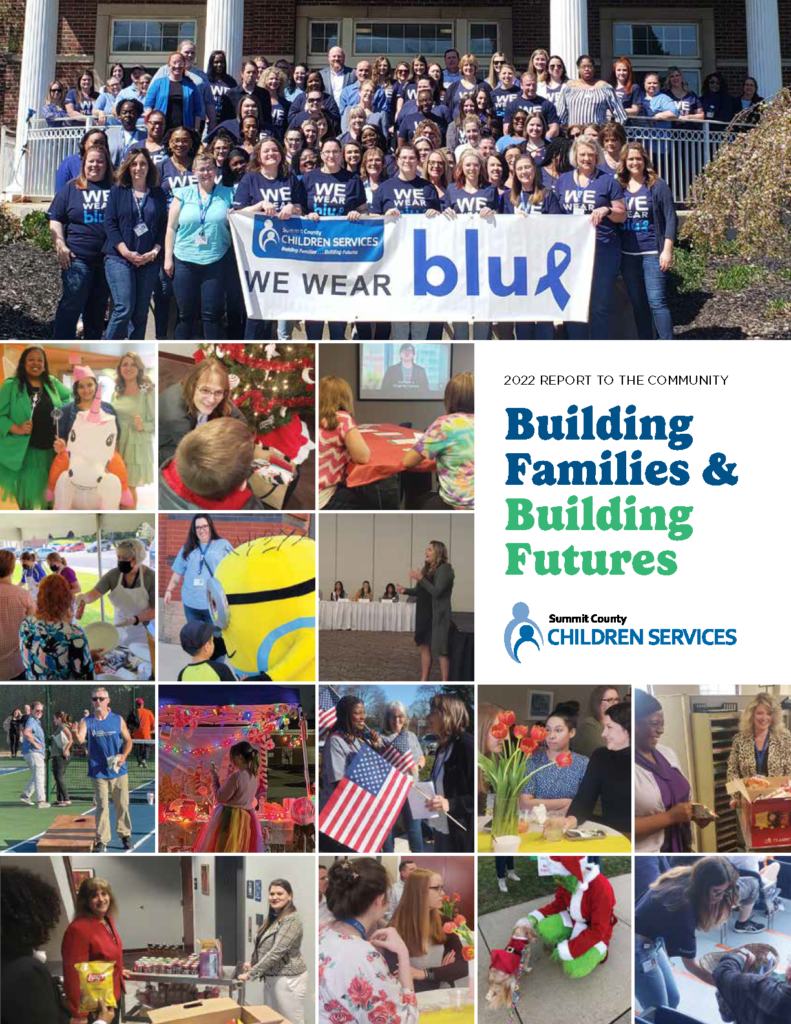Pre-Service Training, Ongoing Certification
To become a licensed foster parent, you must complete the required 24 hours of Pre-Service Training. Trainings are offered virtually and in person.
The State of Ohio maintains an online learning system called CAPS LMS, Child & Adult Protective Services Learning Management System. You are required to create an account in CAPS LMS. Once it’s approved, you can register for online and in-person trainings, complete evaluation surveys, view and print training certificates, track your progress, and view your training record online.
To attend trainings in person, you must register through your CAPS LMS account. NOTE: A minimum of five people must register for an in-person training, or it will be canceled.
At the end of each training program, you will be prompted to complete the evaluation survey. Your training will not show as being ‘completed’ until the evaluation survey has been submitted. If you attend a training in person you will need to complete and submit the evaluation survey through your CAPS LMS account.
You are strongly encouraged to create an account in CAPS LMS. If you don’t have a computer, you can use the computers at the Northeast Ohio Regional Training Center located at Summit County Children Services or at your local public library.
If you have questions about CAPS LMS, please contact Kimberly Gear (330) 379-1976 or at [email protected].
To become a licensed foster parent, you are required to
complete the 24 hours of Pre-Service Training (15 courses). Trainings are offered virtually and in
person. It is highly recommended the trainings be taken in the order they appear below.
Curriculum Information – Preservice 2023 – Caregiver’s Corner (weebly.com)
Pre-Service Training Schedule (July/August/September 2023) – Summer 2023 Preservice.pdf (ocwtp.net)
Orientation (Self-Directed)
This course, part of the
Preservice training series, introduces learners to the child protection system
and the home study process. The differences between foster care, adoption, and
kinship care are also discussed.
Caregiver Role &
Responsibilities (Self-Directed)
This course, part of the
Preservice training series, helps learners understand their role on the child
protection team as defined by state rules and agency policies. This course also
provides an overview of the caregiver’s responsibilities including advocacy,
mandated reporting, supporting the Family Case Plan, partnering with the
primary family, and meeting the child’s needs.
The Basics of Placement (Instructor-Led)
This course, part of the
Preservice training series, helps learners understand how children come into
care and are matched with a family. Laws influencing matching decisions are
discussed, including MEPA, ICWA, Title VI. Learners will understand the
importance making an informed decision about the placement and how to create an
environment in which the child feels safe.
Trauma Overview (Instructor-Led)
This course, part of the
Preservice training series, defines trauma and explores how trauma influences
brain architecture, development, and the ability to attach. Learners will
consider how trauma may impact not just the child, but others on the child
protection team. Learners will think about how their trauma histories may
impact how they will provide care.
The Impact of Trauma on
Children in Care (Instructor-Led)
This course, part of the
Preservice training series, focuses on how trauma impacts the children in care.
Learners will consider what new skills and knowledge they will need to provide
appropriate care to children who have been impacted by trauma.
Permanency (Instructor-Led)
This course, part of the
Preservice training series, explains the importance of permanency and reviews
permanency options for children in care, including reunification and adoption.
Adoption supports, including subsidies, are discussed. Learners will consider
how they can help prepare children for permanency.
Maintaining the Child’s
Connections (Instructor-Led)
This course, part of the Preservice training series, explores the importance of maintaining the child’s connections to their primary family and other important adults and peers. Learners will be introduced to the C.A.R.E. Guide, Ohio’s recommended best practice in co-parenting. Learners will consider strategies to support the child’s important relationships.
Partnering with the Primary
Family (Instructor-Led)
This course, part of the
Preservice training series, helps learners understand their need to partner
with the primary family for the child’s benefit. The importance of empathy is
explored, and learners consider child protection from the perspective of the
primary family. Learners will hear about the value of partnering from those
with lived experience.
Effects of Caregiving (Instructor-Led)
This course, part of the
Preservice training series, will help learners take a realistic look at
caregiving including stressors and challenging events. This course defines
burnout and secondary traumatic stress and explores the risk to caregivers. Learners
will understand the importance of self-care and develop a self-care plan.
Child Development (Instructor-Led)
This course, part of the
Preservice training series, discusses how to find and apply good child
development information. It introduces the importance of providing positive
childhood experiences and supporting nurturing relationships. Learners are made
aware of the concept of normalcy and how to apply the reasonable and prudent
parenting standard.
Adolescent Development (Instructor-Led)
This course, part of the
Preservice training series, explores what happens during adolescence, including
brain development, identity development, and life skills development. Learners
will consider how they can support adolescents through this period of development.
Diversity Foundations (Instructor-Led)
This course, part of the
Preservice training series, introduces the concepts of diversity competence and
cultural humility, disproportionality, and disparity. Learners will consider
how equity and inclusion efforts can mitigate disparity and disproportionality.
Learners will also explore their own implicit bias and think about how they can
confront their bias. Strategies for creating an inclusive and equitable home
will be discussed.
Discipline Foundations (Instructor-Led)
This course, part of the
Preservice training series, discusses the knowledge and skills needed to
appropriately discipline children. Learners will consider the importance of
re-framing behavior and taking an approach that focuses on relationship,
managing their emotions, and being intentional. Learners will also discover how
to determine if a discipline strategy is appropriate.
Medication Management (Self-Directed)
This course, part of the
Preservice training series, discusses the caregiver’s role in medication
management and advocacy. The five “rights” of medication administration are
introduced, and medication-related rules are reviewed.
Adult/Child/Infant CPR with AED
& First Aid (Instructor-Led)
This course, part of the Preservice
training series, provides caregivers with the knowledge and skills needed to
recognize and respond appropriately to cardiac, breathing, first aid, and
environmental emergencies. Learners will gain awareness in giving immediate
care to an injured or ill person and to decide whether advanced medical care is
needed for all ages, including adults, children, and infants.
Once an individual is licensed as a foster parent, he/she is required to complete a minimum of 40 hours of continuing training during each two-year certification period. Continued training will consist of courses that a foster caregiver must complete in accordance with the caregiver’s written needs assessment and continuing training plan. Foster caregivers are encouraged to complete a minimum of 20 training hours in each year.
For newly-licensed foster caregivers, The Fundamentals of Fostering workshops were developed to build on the learning provided during pre-service training and will allow caregivers to go beyond awareness and knowledge by developing skills that they can apply to their new roles as foster caregivers. These workshops are not required but highly recommended for all foster caregivers during their first two years of fostering.
Click here for training description for The Fundamentals of Fostering workshops.
Aside from classroom training, foster parents may use the following activities as opportunities for expanded training with the training supervisor’s pre-approval: video presentations, computer programs, on-line training, public information television programs, educational programs offered through various sources in the community, other professional education and training, and foster parent district meetings when there is a designated training scheduled. Foster parents may only achieve up to 20 percent of his or her continuing training requirements using these designated methods. Foster parents must obtain a certificate of attendance and/or complete a documentation form to obtain credit.
Foster parents are also required to complete and maintain certification/recertification for First Aid and Infant, Child and Adult Cardiopulmonary Resuscitation (CPR).
Pre-service training may not be counted towards the completion of continuing training requirements
Summit County Children Services provides ongoing training opportunities for its active foster parents. .For more Information about training and to see the training schedule for foster parent training offered in other counties through the Northeast Ohio Regional Training Center refer to www.ocwtp.net/NEORTC.htm.
Foster Parent Training Schedules
View foster parent training classes offered through the Northeast Ohio Regional Training Center at Summit County Children Services. NOTE: There are no foster parent trainings offered in July.
For more information on the Foster Parent Training Program, contact Kimberly Gear at 330-379-1976. or by e-mail at [email protected].
Summit County Children Services
Telephone: (330) 379-1990
Fax: (330) 379-1924
Email: [email protected]






